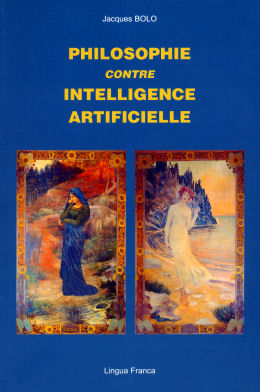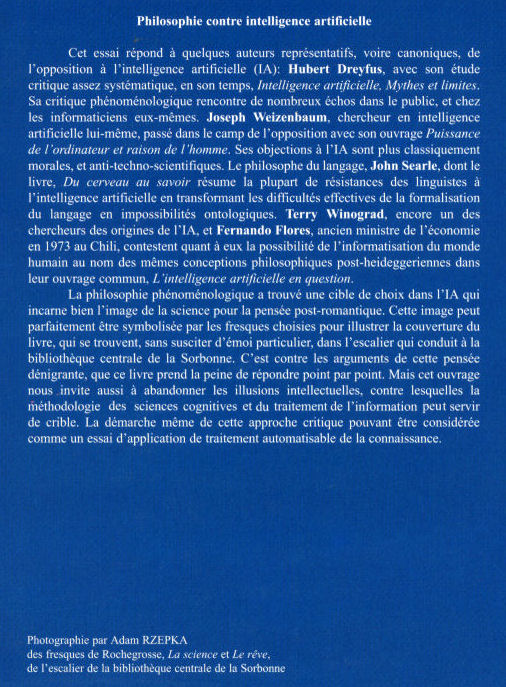Jacques BOLO
PHILOSOPHIE contre INTELLIGENCE ARTIFICIELLE
Novembre 1996, ed. Lingua Franca, Paris, 376 p.
(Text in French)

|  |
|
RÉSUMÉ Cet essai répond à quelques auteurs représentatifs, voire canoniques, de l'opposition à l'Intelligence artificielle (IA) : Hubert Dreyfus, avec son étude critique assez systématique, en son temps, Intelligence artificielle, Mythes et limites. Sa critique phénoménologique rencontre de nombreux échos dans le public, et chez les informaticiens eux-mêmes. Joseph Weizenbaum, chercheur en intelligence artificielle lui-même, passé dans le camp de l'opposition avec son ouvrage Puissance de l'ordinateur et raison de l'homme. Ses objections à l'IA sont plus classiquement morales, et anti-techno-scientifiques. Le philosophe du langage, John Searle, dont le livre, Du cerveau au savoir, résume la plupart des résistances des linguistes à l'intelligence artificielle en transformant les difficultés effectives de la formalisation du langage en impossibilités ontologiques. Terry Winograd, encore un des chercheurs des origines de l'IA, et Fernando Flores, ancien ministre de l'économie en 1973, au Chili, contestent quant à eux la possibilité de l'informatisation du monde humain au nom des mêmes conceptions phénoménologiques post-heideggeriennes dans leur ouvrage commun, L'intelligence artificielle en question. La philosophie phénoménologique a trouvé une cible de choix dans l'IA qui incarne bien l'image de la science pour la pensée post-romantique. Cette image peut parfaitement être symbolisée par les fresques choisies pour illustrer la couverture du livre, qui se trouvent, sans susciter d'émoi particulier, dans l'escalier qui conduit à la bibliothèque centrale de la Sorbonne. C'est contre les arguments de cette pensée dénigrante que ce livre prend la peine de répondre point par point. Mais cet ouvrage nous invite aussi à abandonner les illusions intellectuelles, contre lesquelles la méthodologie des sciences cognitives et du traitement de l'information peut servir de crible. La démarche même de cette approche critique pouvant être considérée comme un essai d'application de traitement automatisable de la connaissance. Photographie de couverture par Adam RZEPKA Un résumé plus complet a été rédigé à l'occasion de la réédition en ebook en juin 2016 |
ABSTRACT This essay replies to some representative authors, canonic indeed, of the opposition to artificial intelligence (AI) : Hubert L. DREYFUS, with his study, systematic enough in its time, What Computers can't do. His phenomenological critic meets a numerous audience, even among computer scientists. Joseph WEIZENBAUM, research worker in artificial intelligence himself, gone over to the opposition with his book Computer Power and Human Reason. His objections are classically moral and anti-techno-scientific. The philosopher John R. SEARLE, whose book Mind, Brain and Science reminds us most of the resistances of linguistic scientists against artificial intelligence, turning the real difficulties of formalization of language in ontological impossibilities. Terry WINOGRAD, another research worker of the early times of AI, and Fernando FLORES, former economy minister of Chile in 1973, both rebels against the computerization of the human's world - thanks to the phenomenological post-hedeggerian way of think -, in their common work, Understanding Computers and Cognition. Phenomenological philosophy has found the perfect target with AI, which embodies the image of science for the post-romantic thinking. This image can be perfectly symbolized by the frescos, choosen for the cover of this very book, situated on the walls of the Sorbonne University Library stairs! Againts the arguments of this running down romantical thinking, this book make the effort to answer on every point. But this work invites us to give up the intellectual illusions too, against which the method of cognitive sciences and information processing can be used as riddle. Incidentally, the approach of this critical method itself can be considered too as an automatic knowledge management try. Cover photograph by Adam RZEPKA of Rochegrosse's frescoes, The Science et Le Dream in the stairs of the Sorbonne Central Library |